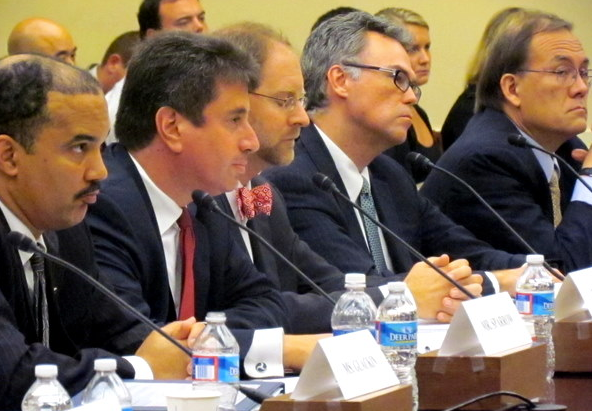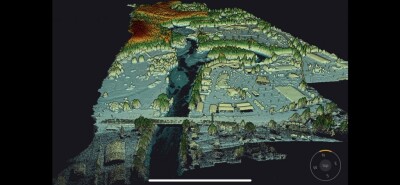Defense Appropriations bill passage seems to shut the door
WASHINGTON – For the past year, LightSquared, a firm looking to set up a terrestrial wireless 4G broadband network in the 35-megahertz band, and the many users of GPS, which operates in the wireless transmission band right next door, have been battling in front of the FCC. LightSquared was given tentative permission to operate early in 2011, but the permission was contingent on show that GPS devices would not be significantly impacted by LightSquared’s transmissions.
The two sides have spent the last year going back and forth, both in front of the FCC and in the court of public opinion, over whether LightSquared’s “fixes” were enough to allow them to go forward. (See our coverage of the back and forth here.)
However, the battle may have been decided by that portion of the government that knows battling best: The Defense Department.
As noted by many publications, including New Scientist, HR 1540, the Defense Appropriations bill that was passed on the first session of the One Hundred Twelfth Congress, Jan. 5, contains language that would seem to end all discussion:
Section 911, a, 1: “CONTINUATION OF CONDITIONS UNTIL INTERFERENCE ADDRESSED.—The Federal Communications Commission shall not lift the conditions imposed on commercial terrestrial operations in the Order and Authorization adopted on January 26, 2011 (DA 11–133), or otherwise permit such operations, until the Commission has resolved concerns of widespread harmful interference by such commercial terrestrial operations to covered GPS devices.”
Those “covered GPS devices” are essentially all those utilized by the Department of Defense.
There was some talk that LightSquared’s proposed solution, which involved not using a portion of its available bandwidth so as to only affect one percent of GPS devices, might be acceptable to the FCC. Essentially, LightSquared has already spent some $3 billion dollars setting up its network, and there was big business to be done with 4G (Sprint had signed a multi-billion-dollar agreement to use LightSquared’s network). Further there was some evidence that GPS manufacturers were overstepping their bandwidth allotment as it was. Perhaps, some thought, LightSquared’s solution was an acceptable compromise, though it would force all manner of government agencies, surveying firms, and many others using high-end GPS devices to buy new equipment or retrofit their existing technology.
In testimony in front of the FCC, the DoT even indicated it was exploring non-GPS solutions to its positioning problems.
The Obama administration was behind LightSquared’s efforts because it believed it was a way to get more broadband access for those in rural areas.
However, the matter now appears to be settled by HR 1540. Before LightSquared can go forward, they need to provide proof they don’t interfere with any defense-related GPS devices, there has to be a hearing to consider that proof, and:
“At the conclusion of the proceeding on such commercial terrestrial operations, the Federal Communications Commission shall submit to the congressional committees described in subparagraph (B) official copies of the documents containing the final decision of the Commission regarding whether to permit such commercial terrestrial operations. If the decision is to permit such commercial terrestrial operations, such documents shall contain or be accompanied by an explanation of how the concerns described in paragraph (1) have been resolved.”
As even LightSquared’s proposed solution failed tests to the point that Victor Sparrow, director, spectrum policy, Space Communications and Navigation, Space Operations Mission Directorate, at NASA, testified to the FCC that, “it is clear to NASA that the FCC-imposed condition requiring resolution of GPS interference issues prior to commencing commercial operations has not been satisfied,” it would seem unlikely that LightSquared will be able to find a way to go forward without another law being passed of some sort to lift the requirements in HR 1540.
That is likely why Sprint announced in a call with investors that it is “putting on hold the groundwork for its network-hosting venture with LightSquared” and has given the company until the end of January to win FCC approval. Considering the pace of government, even if LightSquared could solve the problem by then, it would seem impossible for the necessary committee meetings and reports to be conducted and filed by then.
However, a LightSquared spokesman, Chis Stern, told NextGov in an email that “the NDAA language does not change the current review process, which the FCC put in place a year ago when it granted its original waiver to LightSquared. At that time, the FCC said it would not move forward until the GPS interference issue is resolved. The FCC still retains full jurisdiction over the issue although the NDAA does direct the Defense Department to make a report to Congress if it has concerns about interference.”
LightSquared has already spent more than $1.25 million lobbying Washington to approve its proposals, and will continue to make appeals, but should the January 31 deadline pass, there is speculation the company would quickly run out of money as financial backers abandon the company, effectively ending the battle for good.






